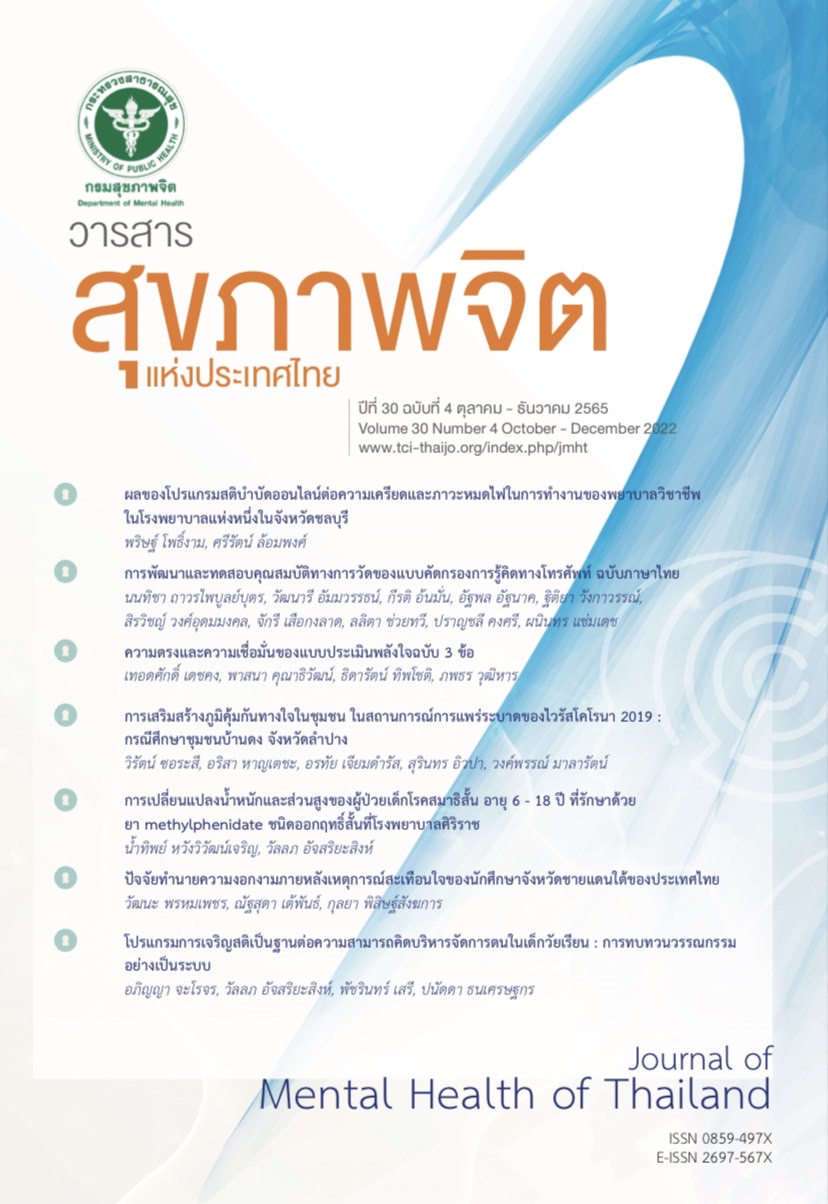การพัฒนาและทดสอบคุณสมบัติทางการวัดของแบบคัดกรองการรู้คิดทางโทรศัพท์ ฉบับภาษาไทย
คำสำคัญ:
การคัดกรองทางโทรศัพท์, ความสามารถของการรู้คิด, วัยผู้ใหญ่บทคัดย่อ
วัตถุประสงค์ : เพื่อพัฒนาและตรวจสอบคุณภาพของแบบคัดกรองการรู้คิดทางโทรศัพท์ ฉบับภาษาไทย
วิธีการ : พัฒนาแบบคัดกรองการรู้คิดทางโทรศัพท์ ฉบับภาษาไทย และตรวจสอบดัชนีความตรงเชิงเนื้อหา โดยผู้เชี่ยวชาญ 5 คน ตรวจสอบคุณภาพของแบบคัดกรองในกลุ่มตัวอย่างอายุ 23 - 80 ปี จำนวน 45 คน ด้วยการทดสอบความเชื่อมั่นภายใน และทดสอบความเที่ยงตรงเชิงเหมือนโดยการวิเคราะห์ค่าสัมประสิทธิ์สหสัมพันธ์เพียร์สันกับแบบประเมิน telephone Montreal cognitive assessment (Tele-MoCA)
ผล : แบบคัดกรองการรู้คิดทางโทรศัพท์ ฉบับภาษาไทย มีค่าดัชนีความตรงเชิงเนื้อหาทั้งฉบับ (S-CVI) เท่ากับ 0.88 ค่าความเที่ยงจากความสอดคล้องภายในเท่ากับ 0.83 และมีความสัมพันธ์เชิงบวกในระดับปานกลางอย่างมีนัยสำคัญทางสถิติกับผลคะแนนรวมที่ได้จากแบบประเมิน Tele-MoCA (r = .61, p < .001)
สรุป : แบบคัดกรองการรู้คิดทางโทรศัพท์ฉบับภาษาไทยมีคุณสมบัติเพียงพอทั้งความตรงและความเชื่อมั่น
Downloads
เอกสารอ้างอิง
Lövdén M, Bäckman L, Lindenberger U, Schaefer S, Schmiedek F. A Theoretical framework for the study of adult cognitive plasticity. Psychol Bull. 2010;136:659-76. doi:10.1037/a0020080.
Guo P, Benito Ballesteros A, Yeung SP, Liu R, Saha A, Curtis L, et al. COVCOG 2: cognitive and memory deficits in long COVID: a second publication from the COVID and cognition study. Front Aging Neurosci. 2022;14:804937. doi:10.3389/fnagi.2022.804937.
larner AJ. Cognitive testing in the COVID-19 era: can existing screeners be adapted for telephone use? Neurodegener Dis Manag. 2021;11(1):77-82. doi:10.2217/nmt-2020-0040.
Lachman ME, Agrigoroaei S, Tun PA, Weaver SL. Monitoring cognitive functioning: psychometric properties of the brief test of adult cognition by telephone. Assessment. 2014;21(4):404-17. doi:10.1177/1073191113508807.
Ihle A, Gouveia ÉR, Gouveia BR, Kliegel M. The cognitive telephone screening instrument (COGTEL): a brief, reliable, and valid tool for capturing interindividual differences in cognitive functioning in epidemiological and aging studies. Dement Geriatr Cogn Dis Extra. 2017;7(3):339-45. doi:10.1159/000479680.
Pollock A, Berge E. How to do a systematic review. Int J Stroke. 2018;13(2):138-56. doi:10.1177/1747493017743796.
Kliegel M, Martin M, Jäger T. Development and validation of the Cognitive Telephone Screening Instrument (COGTEL) for the assessment of cognitive function across adulthood. J Psychol. 2007;141(2):147-70.
วัฒนารี อัมมวรรธน์, นนทิชา ถาวรไพบูลย์บุตร, ฐิติยา วังกาวรรณ์, อัฐพล อัฐนาค, กีรติ อ้นมั่น. เครื่องมือคัดกรองความสามารถด้านการรู้คิดจากการสัมภาษณ์ทางโทรศัพท์: การทบทวนวรรณกรรมเป็นระบบแบบมีขอบเขต [Telephone-based cognitive screening tools: a scoping review]. วารสารการแพทย์และวิทยาศาสตร์สุขภาพ. 2565;29(1):51-66.
Cronin A, Mandich MB. Human development and performance throughout the lifespan. 2nd ed. Boston: Cengage Learning; 2015.
Larner AJ. Neuropsychological neurology: the neurocognitive impairments of neurological disorders. New York: Cambridge University Press; 2008.
Peters R. Ageing and the brain. Postgrad Med J. 2006;82(964):84-8. doi:10.1136/pgmj.2005.036665.
Baddeley A. The episodic buffer: a new component of working memory?. Trends Cogn Sci. 2000;4(11):417-23.
Strauss E, Spellacy F, Hunter M, Berry T. Assessing believable deficits on measures of attention and information processing capacity. Arch Clin Neuropsychol. 1994;9(6):483-90.
Luria, AR. Human brain and psychological processes. New York: Harper and Row Publishers; 1966.
Fuster JM. Executive frontal functions. Exp Brain Res. 2000;133(1):66-70. doi:10.1007/s002210000401.
Halford GS. Development of thinking. In: Holyoak KJ, Morrison RG, editor. The Cambridge handbook of thinking and reasoning. Cambridge: Cambridge university press; 2005. p. 529-58.
Baars BJ, Gage NM. Cognition, brain, and consciousness: Introduction to cognitive neuroscience. 2nd ed. London: Elsevier; 2010.
Larner AJ. Dementia in clinical practice: a neurological perspective: studies in the dementia clinic. London: Springer; 2012.
Cohen J. Statistical power analysis for the behavioral sciences. 2nd ed. Hillsdale, NJ: Erlbaum; 1988.
Bujang MA, Omar ED, Baharum NA. A review on sample size determination for Cronbach's alpha test: a simple guide for researchers. Malays J Med Sci. 2018;25(6):85-99. doi:10.21315/mjms2018.25.6.9.
สุนันทา ฉันทกาญจน์, ปเนต ผู้กฤตยาคามี, ณัฏฐา สายเสวย. ความแม่นตรงของคำถามคัดกรองภาวะซึมเศร้า 2 คำถาม ที่ใช้กับผู้ป่วยในหน่วยรับปรึกษาภาวะทางจิตเวช โรงพยาบาลศิริราช [Accuracy of the two-question screening for depression in psychiatric patients at the consultation liaison unit, faculty of medicine Siriraj hospital, Mahidol university]. วารสารสมาคมจิตแพทย์แห่งประเทศไทย. 2557;59(1):51-61.
ธรณินทร์ กองสุข, สุวรรณา อรุณพงค์ไพศาล, ศุภชัย จันทร์ทอง, เบญจมาศ พฤกษ์กานนท์, สุพัตรา สุขาวห, จินตนา ลี้จงเพิ่มพูน. ความเที่ยงตรงตามเกณฑ์การวินิจฉัยโรคซึมเศร้าของแบบประเมินอาการซึมเศร้า 9 คำถาม ฉบับปรับปรุงภาษากลาง [Criterion-related validity of the 9 questions depression rating scale revised for Thai central dialect]. วารสารสมาคมจิตแพทย์แห่งประเทศไทย. 2561;63(4):321-34.
Limpawattana P, Tiamkao S, Sawanyawisuth K. The performance of the Rowland Universal Dementia Assessment Scale (RUDAS) for cognitive screening in a geriatric outpatient setting. Aging Clin Exp Res. 2012;24(5):495-500. doi:10.3275/8296.
Hemrungrojn S, Tangwongchai S, Charoenboon T, Panasawat M, Supasitthumrong T, Chaipresertsud P, et al. Use of the Montreal cognitive assessment Thai version to discriminate amnestic mild cognitive impairment from Alzheimer's disease and healthy controls: machine learning results. Dement Geriatr Cogn Disord. 2021;50(2):183-94. doi:10.1159/000517822.
Wittich W, Phillips N, Nasreddine ZS, Chertkow H. Sensitivity and specificity of the Montreal cognitive assessment modified for individuals who are visually impaired. J Vis Impair Blind. 2010;104(6):360-8. doi:10.1177/0145482X1010400606.
Klil-Drori S, Phillips N, Fernandez A, Solomon S, Klil-Drori AJ, Chertkow H. Evaluation of a telephone version for the Montreal cognitive assessment: establishing a cutoff for normative data from a cross-sectional study. J Geriatr Psychiatry Neurol. 2022;35(3):374-81. doi:10.1177/08919887211002640.
Best JW. Research in Education. 3rd ed. New Jersey: Prenice-Hall Inc.; 1977.
DiBlasio CA, Novack TA, Cook III EW, Dams-O'Connor K, Kennedy RE. Convergent validity of in-person assessment of inpatients with traumatic brain injury using the brief test of adult cognition by telephone (BTACT). J Head Trauma Rehabil. 2021;36(4):E226-32. doi:10.1097/HTR.0000000000000677.
Brandt J, Spencer M, Folstein M. The telephone interview for cognitive status. Neuropsychiatry Neuropsychol Behav Neurol. 1988;1(2):111-7.
Burns A, Harrison JR, Symonds C, Morris J. A novel hybrid scale for the assessment of cognitive and executive function: the Free‐Cog. J Geriatr Psychiatry. 2021;36(4):566-72. doi:10.1002/gps.5454.
Ball LJ, Bisher GB, Birge SJ. A simple test of central processing speed: an extension of the short blessed test. J Am Geriatr Soc. 1999;47(11):1359-63. doi:10.1111/j.1532-5415.1999.tb07440.x.
Meagher J, Leonard M, Donoghue L, O'Regan N, Timmons S, Exton C, et al. Months backward test: a review of its use in clinical studies. World J Psychiatry. 2015;5(3):305-14. doi:10.5498/wjp.v5.i3.305.
Carlew AR, Fatima H, Livingstone JR, Reese C, Lacritz L, Pendergrass C, et al. Cognitive assessment via telephone: a scoping review of instruments. Arch Clin Neuropsychol. 2020;35(8):1215-33. doi:10.1093/arclin/acaa096.
Polit DF, Beck CT. The content validity index: are you sure you know what's being reported? Critique and recommendations. Res Nurs Health. 2006;29(5):489-97. doi:10.1002/nur.20147.
Kliegel M, Martin M, Jäger T. Development and validation of the cognitive telephone screening instrument (COGTEL) for the assessment of cognitive function across adulthood. J Psychol. 2007;141(2):147-70. doi:10.3200/JRLP.141.2.147-172.
Wong A, Nyenhuis D, Black SE, Law LS, Lo ES, Kwan PW, et al. Montreal Cognitive Assessment 5-minute protocol is a brief, valid, reliable, and feasible cognitive screen for telephone administration. Stroke. 2015;46(4):1059-64. doi:10.1161/STROKEAHA.114.007253.
ดาวน์โหลด
เผยแพร่แล้ว
รูปแบบการอ้างอิง
ฉบับ
ประเภทบทความ
สัญญาอนุญาต
ลิขสิทธิ์ (c) 2022 วารสารสุขภาพจิตแห่งประเทศไทย

อนุญาตภายใต้เงื่อนไข Creative Commons Attribution-NonCommercial-NoDerivatives 4.0 International License.
- ผู้อ่านสามารถนำข้อความ ข้อมูล จากวารสารไปใช้ไปใช้ประโยชน์ทางวิชาการได้ เช่น เพื่อการสอน เพื่อการอ้างอิง แต่การนำไปใช้เพื่อวัตถุประสงค์อื่น เช่น เพื่อการค้า จะต้องได้รับอนุญาตเป็นลายลักษณ์อักษรจากกรมสุขภาพจิตก่อน
- ความคิดเห็น ข้อมูล และบทสรุปต่าง ๆ ที่ลงตีพิมพ์ในวารสารสุขภาพจิตแห่งประเทศไทยเป็นของผู้เขียนบทความและมิได้แสดงว่ากองบรรณาธิการหรือกรมสุขภาพจิตเห็นพ้องด้วย




